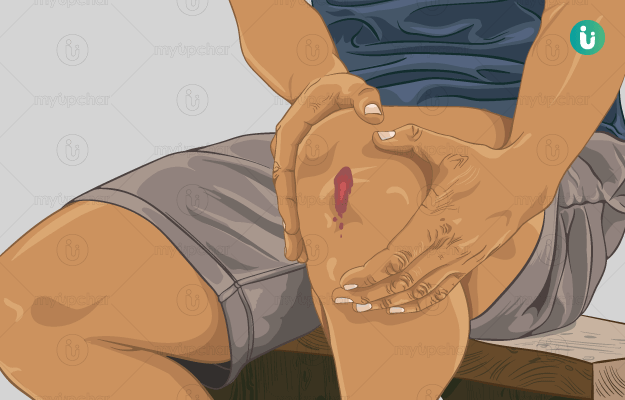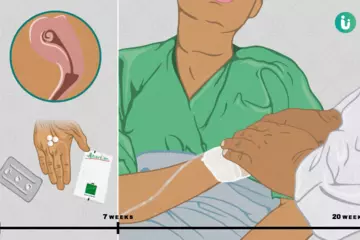What is bleeding?
Blood loss from the body is termed bleeding. Bleeding that occurs inside the body is called internal bleeding while bleeding outside is termed external bleeding. In your body, the blood flows in closed blood vessels; any breach or opening in blood vessels causes the blood to flow out of the vessels, resulting in blood loss. Bleeding can be a symptom of an underlying disease condition or an injury. Menstrual bleeding and bleeding after childbirth are normal conditions.
What are its main signs and symptoms?
Bleeding becomes a matter of concern when its cause is a medical condition or an injury. Your body has a natural clotting mechanism and even if bleeding occurs through an injury, it naturally coagulates, unless you have a clotting disorder. Let’s look at some common signs of bleeding.
- Loss of blood from external orifices like the mouth, nose, ear, anus and urethral opening or the surface of the skin
- Fever
- Lowered haemoglobin
- Shock (if blood loss is not stopped) characterized by cool, pale limbs, low pulse
What are the main causes?
Injury to the body, trauma due to accident or a blow can result in bleeding. Following are some common traumatic causes:
- Injury, bruise or lesions on the skin causing capillaries to rupture
- Trauma to the nose or nose picking causes nasal bleeding
- Intracranial bleeding due to head injury
- Gunshot injury
When blood loss occurs as a result of some medical condition, the causes are referred to as medical causes. Some of these causes are:
- Acute bronchitis
- Liver failure
- Low platelet count
- Vitamin K deficiency
- Blood cancer or any other advanced cancer
- Heavy menstrual period
- Miscarriage or abortion
- Haemophilia- a genetic disorder which causes spontaneous bleeding into joints
Some blood-thinning medications can also lead to bleeding.
How is it diagnosed and treated?
In case of injury or trauma, different scans of the injured organ can be helpful. Many times, internal bleeding goes undetected unless blood tests are performed. Some common diagnostic tools and methods are listed below:
- Blood test showing haemoglobin and haematocrit value
- Platelet count
- Stool examination
- X-ray imaging
- CT scans
- Ultrasound
Your treatment will be primarily aimed at arresting bleeding and once the underlying cause is diagnosed, the treatment module will be accordingly decided. Management of bleeding can be done in the following ways:
- Hormonal treatment for excessive menstrual bleeding.
- Tourniquet application to control blood loss when injured.
- Surgical intervention to stop traumatic bleeding.
- Tissue oxygenation and intravenous fluids to control hypotension due to blood loss.
- Surgical dressings: Collagen-based, fibrin-based and gelatine-based dressings that contain haemostatic agents to arrest the bleeding.
- Vasoconstrictors: Use of agents which stop the bleeding by constricting blood vessels, as in bladder or rectal bleeding associated with cancer. Here, endoscopic delivery at the site of bleeding can also be given.
- Radiotherapy: In blood losses due to cancers of lung, bladder and gastrointestinal tract.
- Vitamin K therapy and fibrinogens in clotting disorders.
- Antifibrinolytics to enhance coagulation.
- Transfusion of platelet concentrates, frozen plasma or blood.
Heavy loss of blood, whether internal or external, can be fatal. In case of heavy bleeding, blood transfusion can be done to make up for the loss.
A word of caution—any kind of blood loss needs immediate attention. So, consult your physician. Timely diagnosis and treatment can save your life.

 Doctors for Bleeding
Doctors for Bleeding  OTC Medicines for Bleeding
OTC Medicines for Bleeding



















